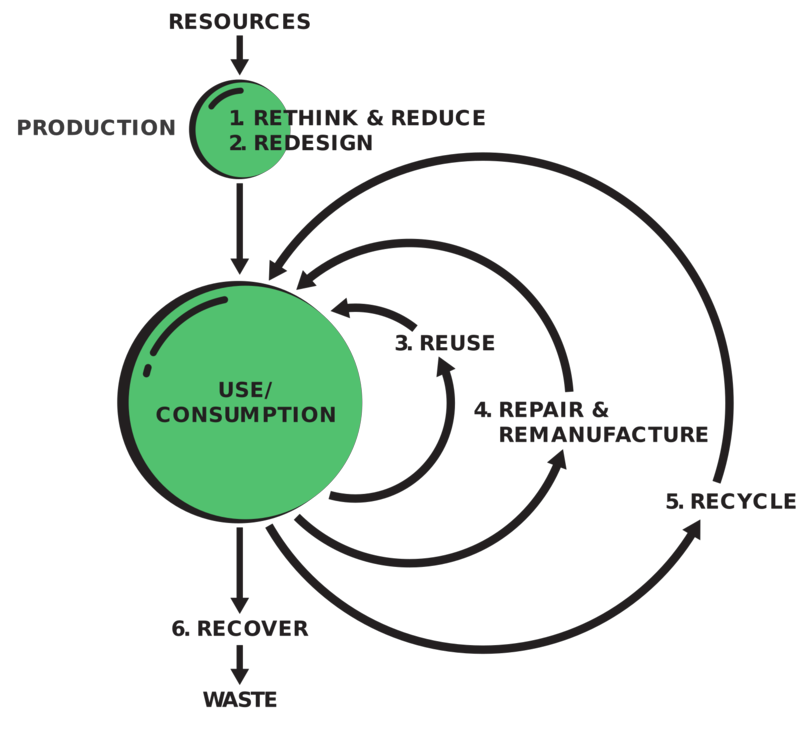Waste
Getting to Net Zero Waste
Identifying where our waste comes from and how it is disposed of is important to understand where we can reduce waste. Approximately 23% of waste produced in Watertown is recycled. Waste that is not recycled in Watertown is incinerated in a waste-to-energy facility. Most of the energy contained in solid waste that is incinerated is from plastic, which leads to higher emissions. The trash sent to incineration in 2019 is enough to cover Victory Field's football field with trash 26 feet high.

What is the Circular Economy?
The circular economy is a model of material management that prevents waste and creates value through emphasis on reusing and regenerating, versus a linear model of using and discarding. Reducing our consumption, and finding useful alternatives for existing waste streams, allows us to move toward a circular economy.
Waste
Reducing Consumption
The more we consume, the more waste we create and have to throw away. While minimizing our waste on a large scale is not without challenges, there are policies, incentives, and educational awareness campaigns that can be used to make the transition easier. Resilient Watertown's Climate and Energy Plan seeks to help residents and businesses reduce their consumption through education and outreach campaigns and a bulk purchasing network for compostable and environmentally friendly goods. The City of Watertown aims to establish an environmentally preferable purchasing policy that focuses on reducing consumption within government operations.
Waste
Organics Recycling in Watertown
The City of Watertown is excited to announce a new partnership with Black Earth Compost! Watertown residents can sign up for free weekly curbside collection of food scraps and receive a complimentary 13-gallon bin. These food scraps and other organic materials will be brought to the Black Earth Compost facilities and processed into nutrient dense finished compost.
To learn more about the program and to enroll, please visit: https://blackearthcompost.com/watertown/
This program is currently only open for residents that receive City-provided trash and recycling pickup. If you have questions about eligibility, please email: recycle@watertown-ma.gov
Diverting food waste out of the waste stream is part of Watertown’s continued effort to achieve the 2030 Massachusetts Waste Reduction Goals. Reducing barriers to entry, such as the financial cost for residents, allows Watertown to offer curbside compost collection to residents who might not have previously been able to participate. Increasing the total number of residents that are diverting food waste brings Watertown one step closer to decreasing its overall waste stream.
Waste
Textile Recycling
With efforts like these, we can continue to divert waste and unwanted items from the our shrinking landfill space, and promote a circular economy that finds creative ways to reuse things and lessens our need to buy new stuff.
Resilient Infrastructure
Protecting Critical Facilities
Climate change can bring serious impacts to our city's infrastructure, from waste management to the electrical grid. These disruptions to services and infrastructure bring impacts to the local economy and community health and well-being. Watertown is taking steps to mitigate impacts to infrastructure from climate change and created a Hazard Mitigation Plan in 2019, received its Municipal Vulnerability Preparedness Community certification in 2020, and has been installing emergency generators at critical facilities like schools.
According to Watertown's Hazard Mitigation Plan, there are 3 critical facilities located in flood areas in Watertown.
Resilient Infrastructure
Safe Removal of Watertown Dam
The Watertown Dam spans the Charles River, upstream from the Watertown Bridge. Several entitles have recommended it be removed to allow for safe passage of fish and wildlife and to improve water quality, prevent hazard of dam failure, and reduce flooding.
What you Can Do
Reduce Your Waste Stream
While the City is working to reduce our waste that gets sent to the incinerator, we need everyone playing their part to improve Watertown's performance.







